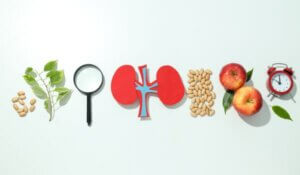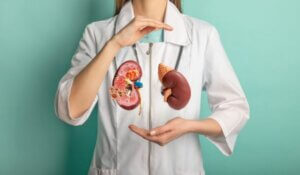 The human body can manage with reduced kidney function for a long time, often without showing any signs. This is why World Kidney Day 2025’s theme is, Are Your Kidneys OK? Detect early and protect kidney health. While chronic kidney disease has no cure, if it is caught early enough, measures can be taken to prevent further damage and preserve kidney function.
The human body can manage with reduced kidney function for a long time, often without showing any signs. This is why World Kidney Day 2025’s theme is, Are Your Kidneys OK? Detect early and protect kidney health. While chronic kidney disease has no cure, if it is caught early enough, measures can be taken to prevent further damage and preserve kidney function.
How can I get involved in World Kidney Day?
Encourage others, especially those at high risk for chronic kidney disease, to prioritize their kidney health by taking the Are Your Kidneys OK quiz or scheduling an appointment with their doctor. You can also explore ways to get involved by visiting the dedicated section on the website for more information.
What is chronic kidney disease?
Kidney disease refers to any condition where the kidneys are damaged and not working correctly. When the problem lasts longer than three months, it is called chronic kidney disease (CKD).
The kidneys are responsible for filtering the blood and producing urine. If the kidneys aren’t functioning correctly, waste and extra fluid can build up in the body. Chronic kidney disease tends to progress over time. However, if it’s caught early, steps can often be taken to slow or prevent it from worsening. Without treatment, the condition may eventually lead to kidney failure, which is why early diagnosis and care are so important.
What are the stages and symptoms of chronic kidney disease?
Kidney disease is often referred to as a “silent disease” because it usually doesn’t show any warning signs at first. Most people won’t notice any symptoms in the early stages of chronic kidney disease. However, as the disease progresses and becomes more severe, individuals may feel unwell.
CKD is usually a very slow process with few symptoms at first. So, CKD is divided into five stages based on how well the kidneys are working and the amount of damage they have. To determine the stage, doctors look at three key factors: blood pressure, eGFR (a measure of kidney function), and ACR (albumin-to-creatinine ratio) from a urine test. Test results can vary depending on a person’s age and the stage of kidney disease.
Stages 1-2: Early Kidney Disease
Early kidney disease is largely undetectable, and most people do not experience any symptoms at this point.
- Stage 1: eGFR is above 90.
- Stage 2: eGFR is between 60 and 89.
Stages 3-4: Mid-Stage Kidney Disease
Most people are first diagnosed when they reach these stages. Symptoms may start to appear as waste builds up in the body and blood pressure rises.
- Stage 3: eGFR is between 30 and 59.
- Stage 4: eGFR is between 15 and 29.
Stage 5: Kidney Failure
At this stage, the kidneys can no longer function properly, and patients will require dialysis or a transplant.
- When the eGFR results are under 15
Symptoms of CKD in the middle and later stages can include the following:
- Increased blood pressure
- Frequent or unusual changes in urination, including needing to wake up frequently at night to use the bathroom
- Urine that appears different, such as foamy or frothy
- The presence of blood in the urine
- Swelling in the legs or ankles (edema,) or around the eyes
- Discomfort or pain in the area around the kidneys
- Fatigue and lack of energy
- Decreased interest in eating
What causes chronic kidney disease?
Diabetes and high blood pressure are two of the leading causes of chronic kidney disease. High blood sugar can harm the blood vessels in the kidneys, making it harder for them to filter waste effectively. Kidney inflammation, also known as glomerulonephritis, can also cause long-term kidney problems. It may be inherited or happen after an infection.
How is chronic kidney disease treated?
Chronic kidney disease has no cure, but treatments can slow its progression. The type of treatment needed depends on how advanced the disease is.
Doctors may focus on preventing cardiovascular issues in the early stages (1-2) of kidney disease. This often includes lifestyle changes, diet, and exercise. Patients are advised to limit their consumption of refined and processed foods that are high in sugar and sodium. They should aim for a healthy weight and include physical activity in their daily lives.
During stages 3-4, treatment may be required to help manage blood pressure such as Vasodip, and treatments to manage blood sugar levels, such as Ozempic, Mounjaro, Tirzepatide, and Semaglutide.
Stage 5 kidney disease occurs when the kidneys can no longer work on their own. At this point, treatment options may include a kidney transplant, dialysis to remove waste and excess fluid from the blood, or supportive care.
Lifestyle measures
Chronic kidney disease can worsen over time, but there are ways to slow its progression and improve quality of life. A healthy diet plays a key role. Eating a variety of fresh, seasonal foods is recommended, while processed foods and added sugars should be kept to a minimum. Salt intake should be limited to under a teaspoon per day, as too much can raise blood pressure. It’s also important to reduce saturated and trans fats in the diet. In the later stages of the disease, doctors may provide specific dietary guidelines.
It’s important to stay active most days of the week. Experts recommend 150 to 300 minutes of moderate exercise or 75 to 150 minutes of intense activity each week. Muscle-strengthening exercises are also key to staying healthy.
Additional recommended changes include quitting smoking, reducing alcohol intake to fewer than two standard drinks per day, and maintaining a healthy weight. Lastly, those at higher risk of kidney disease should get their kidneys checked regularly to stay on top of their health. And what better time to do this than on World Kidney Day?
FAQs
Can you live a long life with kidney disease?
Chronic kidney disease doesn’t always lead to significant health issues, and many individuals can live long, fulfilling lives with the condition. While kidney damage cannot be reversed, CKD doesn’t always progress further with the right interventions. In fact, only a small percentage of people experience advanced stages of the disease.
What not to drink if you have kidney problems?
Consuming sweetened drinks, carbonated beverages like Coca-Cola, and all forms of alcohol can harm the kidneys. Anyone with kidney disease should avoid or cut down on these drinks.
How often should I get my kidneys checked?
Individuals with chronic illnesses such as diabetes or hypertension, which are major contributors to kidney disease, may require more frequent checkups. For people at lower risk, annual testing is usually advised.

















